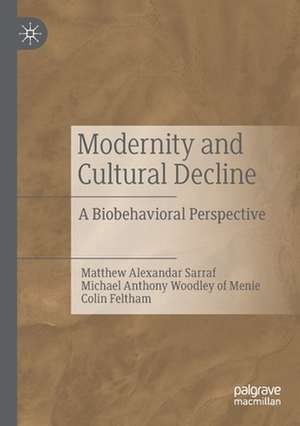Modernity and Cultural Decline: A Biobehavioral Perspective
Autor Matthew Alexandar Sarraf, Michael Anthony Woodley of Menie, Colin Felthamen Limba Engleză Paperback – 17 dec 2020
| Toate formatele și edițiile | Preț | Express |
|---|---|---|
| Paperback (1) | 641.71 lei 6-8 săpt. | |
| Springer International Publishing – 17 dec 2020 | 641.71 lei 6-8 săpt. | |
| Hardback (1) | 644.49 lei 6-8 săpt. | |
| Springer International Publishing – 17 dec 2019 | 644.49 lei 6-8 săpt. |
Preț: 641.71 lei
Preț vechi: 754.95 lei
-15% Nou
Puncte Express: 963
Preț estimativ în valută:
122.81€ • 127.74$ • 101.38£
122.81€ • 127.74$ • 101.38£
Carte tipărită la comandă
Livrare economică 14-28 aprilie
Preluare comenzi: 021 569.72.76
Specificații
ISBN-13: 9783030329860
ISBN-10: 3030329860
Pagini: 307
Ilustrații: XI, 307 p. 5 illus.
Dimensiuni: 148 x 210 mm
Greutate: 0.45 kg
Ediția:1st ed. 2019
Editura: Springer International Publishing
Colecția Palgrave Macmillan
Locul publicării:Cham, Switzerland
ISBN-10: 3030329860
Pagini: 307
Ilustrații: XI, 307 p. 5 illus.
Dimensiuni: 148 x 210 mm
Greutate: 0.45 kg
Ediția:1st ed. 2019
Editura: Springer International Publishing
Colecția Palgrave Macmillan
Locul publicării:Cham, Switzerland
Cuprins
1. Introduction.- 2. Defending Biobehavioral Science.- 3. Medieval and Modern Worlds.- 4. Discontent with Modernity.- 5. Enlightenment Never.- 6. Making the Case for Mutation Accumulation.- 7. The Social Epistasis Amplification Model: A Diachronic Test and Expansion of Theoretical Foundations.- 8. Biocosmic Pessimism.
Notă biografică
Matthew Alexandar Sarraf is a researcher in the areas of psychometrics, evolutionary psychology, and behavior genetics.
Michael Anthony Woodley of Menie, Yr., is a geneticist and ecologist. He is a Lifetime Fellow at the Center Leo Apostel for Interdisciplinary Studies, Vrije Universiteit Brussel, Belgium.
Colin Feltham is Emeritus Professor of Critical Counselling Studies at Sheffield Hallam University, UK.
Michael Anthony Woodley of Menie, Yr., is a geneticist and ecologist. He is a Lifetime Fellow at the Center Leo Apostel for Interdisciplinary Studies, Vrije Universiteit Brussel, Belgium.
Colin Feltham is Emeritus Professor of Critical Counselling Studies at Sheffield Hallam University, UK.
Textul de pe ultima copertă
“Modernity and Cultural Decline is a breathtaking scientific analysis of the rise—and now the decline—of Western civilization. We should be interested—and forewarned.” —Seymour Itzkoff, Professor Emeritus of Education, Smith College, USA
“The book puts human nature, genes and evolution back into historiography and sociology. This is the real thing, sharp minds . . . offering testable hypotheses based on quantitative models.”
—Frank Salter, former researcher of the Max Planck Society, Germany
“A profoundly important book. One can only hope that society finds the will to engage with these vital and consequential ideas.”
—David Skrbina, Senior Lecturer, University of Michigan, Dearborn, USA
“Modernity and Cultural Decline is a supremely bold, thoroughgoing biological account of often unacknowledged . . . negative impacts of modernity. This is the sort of science book of which we need more.”
—Steve Moxon, independent researcher, author of Sex Difference Explained (2016)
This book argues that despite the many real advantages that industrial modernity has yielded—including large gains in wealth, longevity, and (possibly) happiness—it has occurred together with the appearance of a variety of serious problems. Chief among these are probable losses in subjective existential purpose and increases in psychopathology. A highly original theory of the ultimate basis of these trends is advanced, which unites prior work in psychometrics and evolutionary science. This theory builds on the social epistasis amplification model to argue that genetic and epigenetic changes in modernizing and modernized populations, stemming from shifts in selective pressures related to industrialization, have lowered human fitness and wellness.
—Frank Salter, former researcher of the Max Planck Society, Germany
“A profoundly important book. One can only hope that society finds the will to engage with these vital and consequential ideas.”
—David Skrbina, Senior Lecturer, University of Michigan, Dearborn, USA
“Modernity and Cultural Decline is a supremely bold, thoroughgoing biological account of often unacknowledged . . . negative impacts of modernity. This is the sort of science book of which we need more.”
—Steve Moxon, independent researcher, author of Sex Difference Explained (2016)
This book argues that despite the many real advantages that industrial modernity has yielded—including large gains in wealth, longevity, and (possibly) happiness—it has occurred together with the appearance of a variety of serious problems. Chief among these are probable losses in subjective existential purpose and increases in psychopathology. A highly original theory of the ultimate basis of these trends is advanced, which unites prior work in psychometrics and evolutionary science. This theory builds on the social epistasis amplification model to argue that genetic and epigenetic changes in modernizing and modernized populations, stemming from shifts in selective pressures related to industrialization, have lowered human fitness and wellness.
Caracteristici
Advances highly original theory of the ultimate basis of negative trends associated with modernity Unites prior work in psychometrics, evolutionary psychology, and evolutionary biology Critically assesses various competing explanations and perspectives
